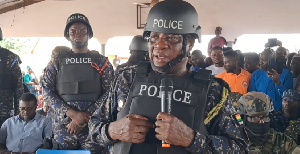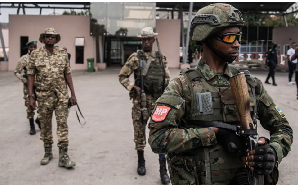Kwaku Sefa Manu
At the recent congress of the NDC in Tamale, ex-President Rawlings made a poor 85 year-old the subject of a conference joke.
Mr. Rawlings recounted the story of a mortuary worker who caused a stir at the 37 Military Hospital in Accra. “Mortuary-man” Atta had come out of his room in the night to urinate. He had his sleeping sheet, a white bed sheet, around him. A soldier, who saw him from the darkness, mistook him for a ghost and started running away. According to Mr. Rawlings, Atta, who did not know that it was he who had scared the soldier, also started running after the cowardly soldier, thinking that someone was after him. It was later that all the runners realized that they had been running away from a non-existent ghost.
Two or three days later, when journalists contacted Atta about the joke, he had a more serious thing to say. Now a frail 85 years old, Attah appealed to the government to help him get accommodation and money to look after himself and his family. He stated that he was proud to have been associated with our former Head of State, but he bemoaned his current living conditions.
Atta is an ordinary person; a person who falls within the category of the social class that Rawlings would call “the people”. Rawlings came to power on 31 December 1981 proclaiming “people’s power”. He said that he would ensure that the living conditions of the ordinary person are improved. Many ordinary people took him at his word. Mortuary workers, such as Atta should therefore have expected that a government under Rawlings would foster an improvement in their living conditions. That was not to be. When Atta reached retirement age at 60 years, Rawlings was still in power. However, “people’s power” did not make a positive difference in his living conditions. He is still poor, and has no reasonable accommodation. He is now calling on the ‘Bastards’ in the government to help look after him.
Instead of a better life in his old age, he is now the subject of a joke from his old friend, ”the People’s Man” and Champion of People’s Power. Where is the power of Atta after nearly 20 years of “People’s Power”?
Whereas according to Mr. Rawlings’ version of the Atta story, Atta was running because he thought someone was after him, Atta had a different account. He was running after the soldier to re-assure him that he was no ghost. So why did Rawlings embellish the story in such a way as to paint Atta as someone who was running in fright? The answer may not be hard to find. The joke had to be at the expense of Atta who needed to be an object of derision to make a good joke. Even President Atta Mills was so embarrassed by Atta’s alleged behaviour that he wondered whether he should not remove the name “Atta” from his own name.
The present state of Atta is only one example of numerous cases of when a person takes advantage of his friends in the process of advancing himself. Whereas recounting the story of Attah made Rawlings feel good, Atta could not have the benefit of a “people’s revolutionary government” with a commitment to look after the interests of ordinary workers (or as they say these days: “foot-soldiers”).
Among the “foot-soldiers” who fought their way amidst blazing guns to release Mr. Rawlings from custody on June 4 1979, only one or two can be said to be Rawlings adherents today. Among the AFRC members (of Captain Kwabena Baah Achamfuor, Staff Sargent Alex Adjei, Corporal Owusu Boateng, Lance Corporal Peter Tasiri, Lance Corporal Sarkodee-Addo, Leading Aircraftman Captain Kojo Boakye Gyan, Major Mensah-Poku, Major Mensah Gbedemah, Lieutenant Commander HC Apaloo, , Warrant Officer (II) Harry K. Obeng, John N. Gatsiko, Lance Corporal Ansah Atiemo, Corporal Sheikh Tetteh, Private Owusu Adu), only one or two currently considers themselves as a friend.
Then came the founding members of the June 4 Movement, who invited Rawlings to join them in 1980 so that they could defend him against the onslaught of the Limann Government. The roll-call includes:
Assakua Agambila, Nicholas Atampugre, Nyeya Yen, Taata Ofosu, Napoleon Abdulai, Gariba Shaibu, Eben Portuphy, Aloysius Denkabi, Zaya Yeebo, Kwasi Adu, Joe Cudjoe, Explo Nani Kofi, etc. Apart from two of these, those who did not escape into exile met a gruesome death later.
Apart from one or two of the other-rank soldiers who led Rawlings into Burma Camp to stage the coup of 31 December 1983, none of them can now be considered as friends. Sgt. Alolga Akatapore (exile), Corporal Halidu Gyiwa (shot dead in 1983), Corporal Aliu (shot dead in 1983), Corporal Eric Asare, Corporal Matthew Adabuga (exile), Corporal Issaka Braimah (exile), Corporal C.C. Addae (died in exile) were all participants in the
Then came the other members of the PNDC: Chris Bukari Atim (he went into exile in 1982); Sergeant Daniel Alolga Akata Pore (he was arrested and later escaped into exile); Joachim Amartey Kwei (he was executed in 1982); Reverend Dr. Vincent Kwabena Damuah ( he was sacked by radio announcement in 1982); Warrant Officer Joseph Adjei Buadi (he ‘resigned’ in 1984), and Brigadier Joseph Nunoo-Mensah (he resigned in 1982). The only one left standing was Mr. Rawlings. These were followed by a plethora of others, most of whom fell by the wayside, not because they were corrupt, but because Rawlings no longer had use for them. For example, Captain (rtd) Kojo Tsikata, P.V. Obeng, Ebo Tawiah, etc are now considered foes.
When NDC came, the Vice President, Mr. Nkensen Arkaah soon found out that if he would not play ball, he could be slapped. And so it came to pass. Most of the new “darlings” with whom Rawlings worked until 2001 are among those who are now described as “greedy bastards”. Not even now President Atta Mills is good enough anymore since he would not be a poodle. As for Atta the Mortuary-Man, he should consider himself lucky. The only thing he appears to have endured is that, in the face of his poverty, he only became an object of laughter. The reason which made Col. Bernasko run into exile would surface very soon, as we find our “önly-standing” hero running a parallel “government” in the form of visiting sick people and schools, and carting .people to have injections. The question would continue to linger as to why, in the trail of one person, there are so many broken bones and skeletons.
Opinions of Thursday, 28 January 2010
Columnist: Manu, Kwaku Sefa














